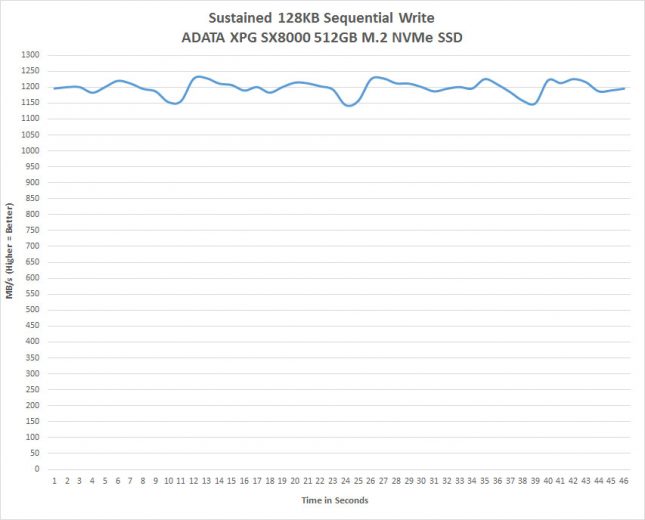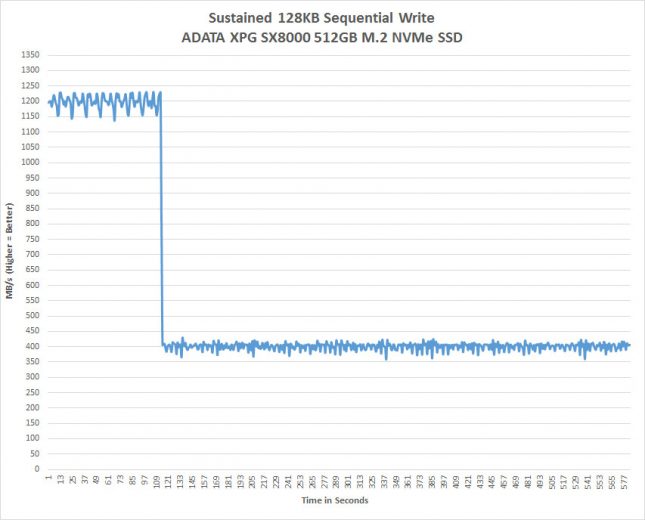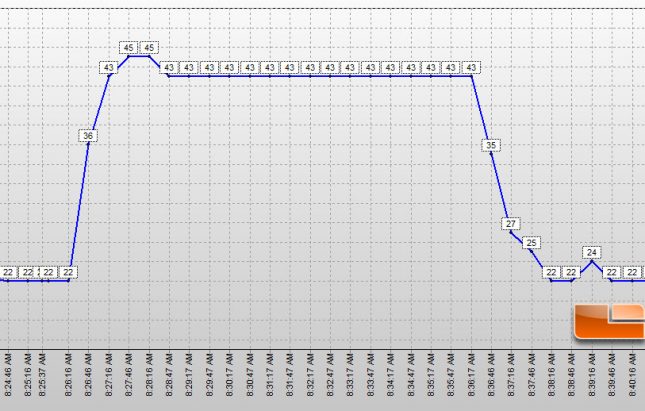ADATA XPG SX8000 PCIe NVMe 512GB SSD Review
Sustained Write Performance & Temperatures
Triple-Level Cell TLC NAND based SSDs perform usually quite well, but when you copy a large amount of data to the drive without and idle time you’ll often find a large drop in write speed. TLC NAND is great in applications where write operations are limited , but is usually not recommended for critical systems that have heavy write operations as they have lower endurance ratings than SLC or MLC NAND and of course sustained write performance isn’t stellar. In recent years drive manufactures have been figured out that by using SLC or TLC treated as SLC as a cache they can keep the drives overall write performance high as long as the amount of data being written to the drive fits in the cache. If you overflow the cache, you are then writing directly to the TLC NAND and the write performance will drop down to that level. It should be noted that the SLC cache will clear once the drive idles, so this only impacts long writes that are many GB in size. This might not be a typical workload scenario for this ultra-value or mainstream drives, but still something worth pointing out!
Let’s take a look at the ADATA XPG SX8000 M.2 PCIe NVMe 512GB drive to see how it handles sustained write scenarios with the 3D MLC NAND.
We secure erased the drive before running this test and found that the performance started out at around 1200 MB/s and remained around that point for the remainder of this 45 second long test.
Here are some 45 second average sustained write speeds on recently tested drives:
- MyDigitalSSD BPX 480GB – 1391.78 MB/s
- Corsair Force MP500 480GB – 1369.39 MB/s
- Patriot Hellfire M.2 480GB – 1226.38 MB/s
- Samsung SSD 960 EVO 1TB – 1223.07 MB/s
- ADATA XPG SX8000 512GB – 1197.80 MB/s
- Samsung SSD 850 EVO 500GB 527.23 MB/s
- Crucial MX300 750GB SSD 522.4 MB/s
- ADATA SU800 512GB SSD 520.85 MB/s
- Toshiba OCZ VX500 512GB SSD 520.41 MB/s
- WD Black PCIe 512GB SSD – 465.64 MB/s
- Intel 600p 512GB – 427.295 MB/s
- Toshiba OCZ Trion 150 480GB 347.75 MB/s
- Samsung SSD 960 EVO 250GB – 326.37 MB/s
- WD Blue SSD 1TB 314.81 MB/s
- Kingston UV400 480GB 267.04 MB/s
- OCZ Trion 100 480GB 192.19 MB/s
- ADATA SP550 480GB SSD 103.53 MB/s
Not bad sequential write performance as the ADATA XPG SX8000 512GB drive finished just behind the Samsung SSD 960 EVO 1TB!
When you take a look at extended sustained write performance you can see that the drives cache fills up just before the 2 minute mark or after 136,163 MB of data written to the drive. This is very impressive! After that point everything is written directly to the NAND Flash and the sequential write performance drops down to around 400 MB/s on average. You’ll like never hit speeds this low though in real life as you have to pound on the drive non-stop for nearly two minutes at top speed to mimic a situation like this and most people aren’t writing 136GB of data at a time to their drive.
ADATA XPG SX8000 PCIe 512GB SSD Temperatures
A quick look at the drives temperatures showed that we were hitting just 45C and that was with a 120mm case fan sitting directly over the ADATA XPG SX8000 PCIe 512GB M.2 NVMe drive blowing cool air over it. Before we started the sustained write test we were bouncing around 22-24C on the drive at idle. We set the polling rate to 30 seconds for this test and you can see how the drive heats up in this test below.
As you can no big concerns, but
Let’s take a look at some common benchmarks!




